Knowledge Economy
Knowledge is thought to be the primary driving force behind the economy of the future. It will create millions of new job opportunities in the job market.
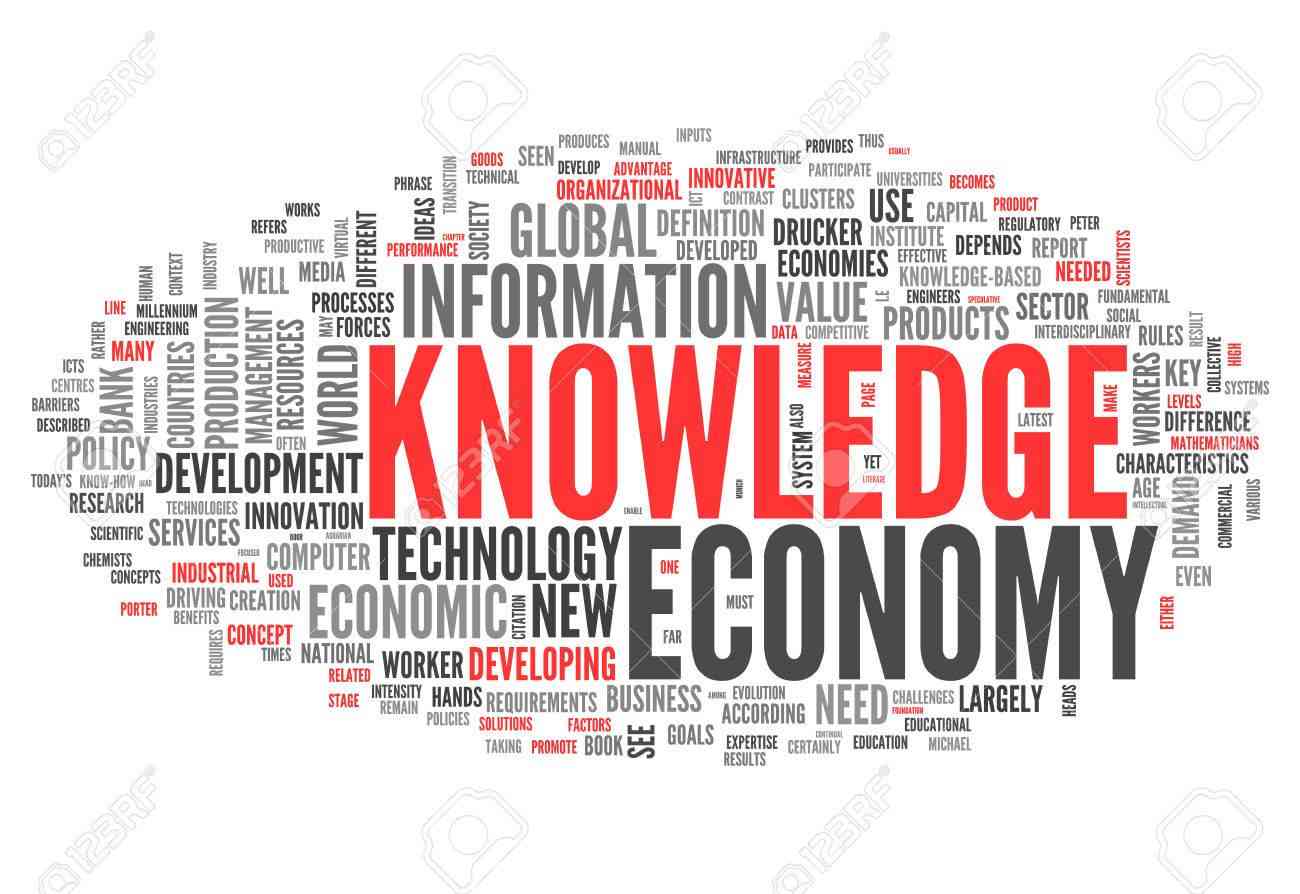

A knowledge economy is a term that refers to either a knowledge economy focused on producing and managing knowledge in the context of economic constraints, or a knowledge-based economy. In the second sense, which is more common, it refers to the use of knowledge technologies (such as knowledge engineering and knowledge management) to produce economic benefits as well as to create jobs.
Whereas land, employment, and capital were the three main factors of production in the old economy, the essential assets in the new economy became technical know-how, creativity, intelligence, and information. The intelligence embodied in computer software and technology across a wide range of products has become more important than capital, materials, or employment. The United Nations estimates that knowledge economies now account for 7% of global GDP and grow at 10% annually. It is worth noting that 50% of productivity growth in the European Union is a direct result of the use and production of information and communications technology.
Based on the preceding, the knowledge economy basically means that knowledge is the primary driver of economic growth. And knowledge economies depend on the availability of information and communication technologies and the use of innovation and digitization. On the contrary, the economy is based on production, where knowledge plays a lesser role, and where growth is driven by traditional production factors, qualified and highly skilled human resources, or human capital, are the most assets. Value in the new knowledge-based economy. In the knowledge-based economy,the relative contribution of knowledge-based industries or their empowerment rises, mostly in medium and high-tech industries, such as financial and business services.
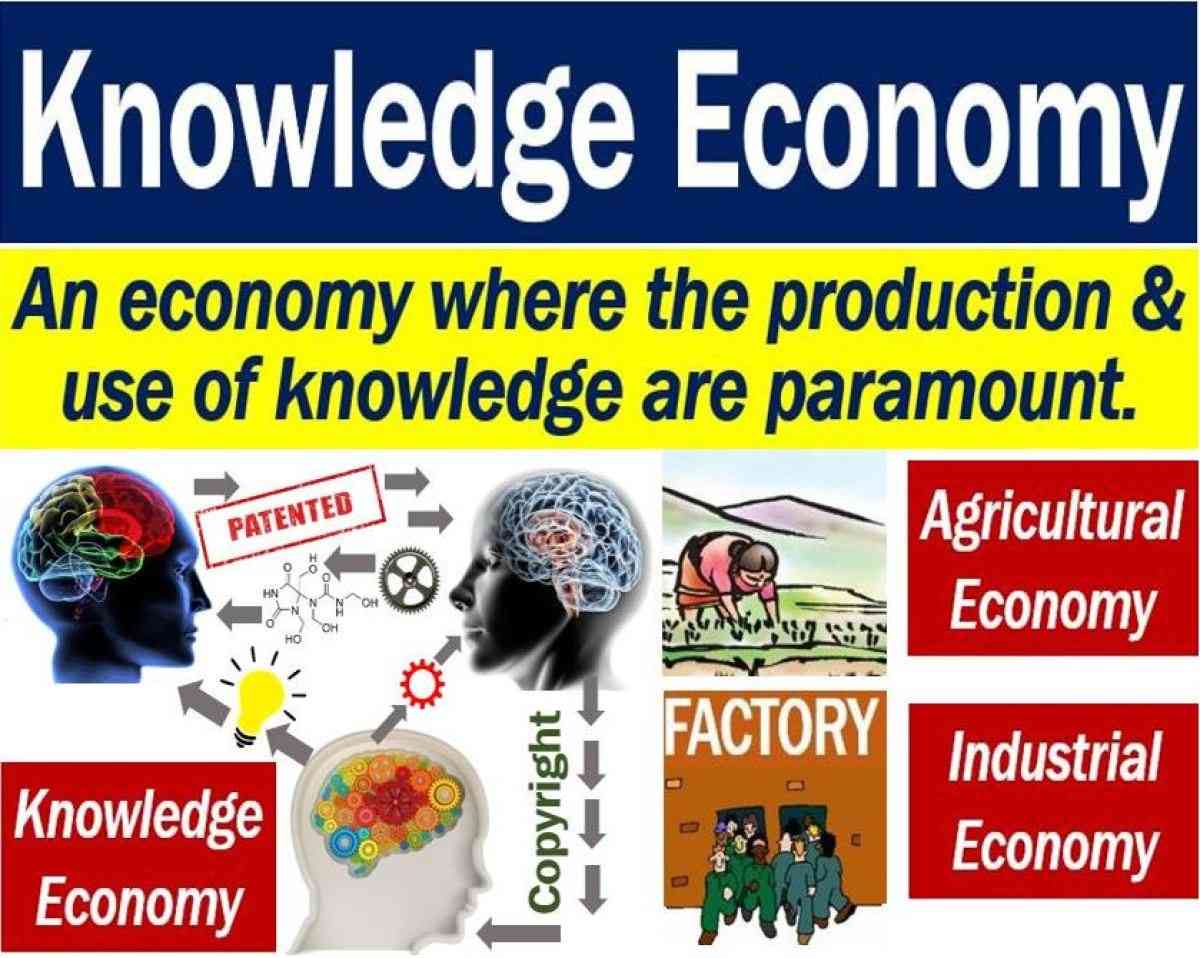
Knowledge Economy Characteristics:
A knowledge-based economy and a knowledge-based economy has a certain number of characteristics:
- Innovation: An effective system of business links with academic institutions and other organizations that can keep pace with the growing knowledge revolution and absorb and adapt it to local needs.
- Education: It is essential to productivity and economic competitiveness. Governments must provide skilled and creative labor or human capital that can integrate modern technologies into work. The need to integrate information and communications technology as well as creative skills into educational curricula and lifelong learning programs is growing.
- The information and communications technology: The infrastructure facilitates the dissemination and processing of information and knowledge and adapts it to local needs.
- Incentives based on strong economic foundations: It can provide all the legal and policy frameworks aimed at increasing productivity and growth. These include policies that aim to make information and communications technology more accessible and easy, reduce tariffs on technology products, and increase the competitiveness of small and medium enterprises.
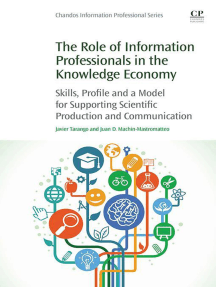
When describing the current global economy, two basic terms are frequently used: globalization and the knowledge economy. The world has been witnessing increasing globalization of economic affairs due to several factors, the most important of which is the revolution in information and communications technology, as well as the easing of trade restrictions at the national and international levels. In parallel, the world witnessed a sharp rise in the intensity of knowledge in economic activities, driven by the revolution in information and communications technology and the acceleration of technological progress.
The main driving forces in the knowledge economy:
i. Globalization has become more global markets and products.
ii. Information revolution. Knowledge/Information has become a high density in production, so the dependence has clearly increased on information and knowledge; About 70 percent of workers in developed economies are information workers. Many factory workers are using their heads more than they can.
iii. The spread of computer networks, and the link between developments such as the Internet, has made science as one village more than ever
As a result, the need for continuous development of goods and services has increased, and in many cases, they are being bought and sold through electronic networks. This maximizes the need to become familiar with the applications of new technology as it depends on meeting economic demand. These forces have contributed to the expansion of international production, stimulated by the following long-term factors:
a. The liberalization of policies and the disappearance of borders between countries, which gave way to all kinds of foreign direct investment and the various capital arrangements.
b. Rapid technological change and lower transportation and communication costs have made it more economical to integrate geographically dispersed processes and to move products and components across the world in search of efficiency.
c. Increased competition forced companies to discover new ways to improve their efficiency, including using new markets and relocating specific production activities to reduce costs.
Knowledge coding:
Knowledge reflects the extent of control over the different forms of information. Knowledge can be divided into four forms:
- Knowledge of the information.
- Knowledge of the cause.
- Knowledge of how.
- Knowledge of specialists.
Information technology is now coding these types of knowledge and thus converting them into commodities that affect (more directly than before) the economy, money, and national strength.
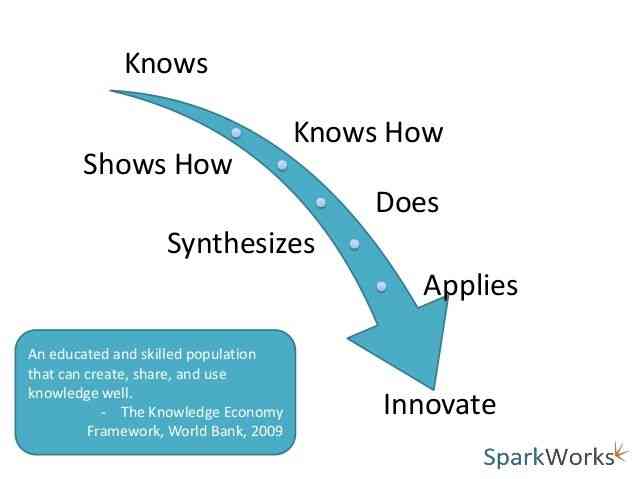
"Knowing what" involves knowing the facts, and it is closer to knowing the traditional information, such as knowing the medical facts by the doctor or knowing the laws and laws by the lawyer and their likes.
"Knowing the cause" includes knowing the reasons behind the phenomena of nature and their investment in the service of man, and this knowledge lies behind scientific and technological progress and behind industry and the production of various commodities. The sources of this knowledge are concentrated in the units of education, research, public and private development.
“Know-how” refers to the experience in implementing things, whether these things are managing individuals or operating processes or operating devices and machines or the uses of different technology, and this knowledge is usually the property of companies and institutions. It needs access On some of them to different mechanisms, complicated and expensive.
"Knowing who specializes" or "knowing who" - the importance of this knowledge is increasing, knowing who can do something necessary to carry out this work in a sound and economical way. And activating the economy currently needs this knowledge much. This knowledge also accelerates the implementation of projects surely and soundly.
.
Teaching the control of these four types of knowledge is done through different media. "Knowledge of information" and "knowledge of illness" are taken from books, educational and training institutions, and from databases. As for the other two types, they are not taken completely unless by practice.
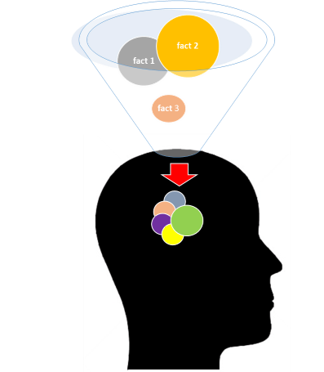
But providing knowledge and transforming it into information has made IT an enormous tool in putting knowledge within reach of the world, especially as information networks such as the Internet and others make short distances, short time, cost simple and secure trading. This coding of knowledge and its digital storage based on its availability as information in the form of books, magazines, worksheets, references, indexes, pictures, sound, films and drawings, in addition to facilitating its transmission through global digital networks makes it a tool for economic, cultural and security development with a very effective role. This is what is recognized by us from the "Information Society" Who generates, transmits, and uses knowledge to serve him in all fields.

Providing knowledge and converting it into digital information makes it turn into a commodity that increases in its types every day and increases its role in the global economy that turns into a "knowledge economy."
Knowledge networks:
The knowledge economy relies mainly on disseminating and investing information, in addition to generating it, of course. The success of institutions and companies depends a lot on their effectiveness in gathering knowledge and using them to raise productivity and create new goods and services. The economy has been led by a hierarchical chain of knowledge networks in which information changes at rapid rates. There are many types of knowledge networks such as university networks, networks of research centers and networks of information institutions such as libraries, publishing houses, documentation centers, various industry networks, and other networks. A society that does not care about networking knowledge institutions has become a society lagging behind the global economic process.
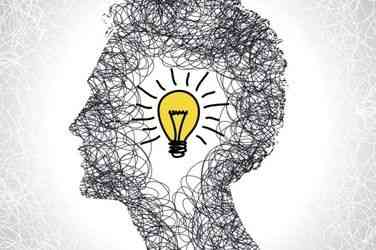
Knowledge, education and job opportunities:
The knowledge economy requires more significant efforts in the fields of education and training, as well as a new type of education and training. The number of workers in the information field is increasing steadily, and this requires the training of scientists and workers in this field and in the areas of information technology, which are less than what is necessary and less than the need. Information illiteracy has become one of the obstacles hindering progress. On the other hand, the rapid development of knowledge requires lifelong training, it also requires a higher level of scientific and technological employment than before, and the need to acquire a queen of education has become an urgent need for workers. Higher wages will be directed towards workers who can deal with encoded information and technological knowledge more than they are towards manual work or physical effort on the other hand, obtaining knowledge has become more accessible and less costly than before in the presence of knowledge networks, but this requires knowledge of foreign languages, especially English, as it demands efforts in Localization.
Studies in several countries indicate a high demand for a specialized workforce in dealing with information and information technology and with knowledge in general and a decrease in demand for uneducated and inexperienced labor, and this will affect the structure of the labor market in general and the distribution of wages. These phenomena require governments to reconsider salaries, employment and education policies.
The bottom line is that there is a global demand for the specialized workforce in the field of dealing with knowledge and with information and an increase in the wages of this hand, as we are witnessing a rapid development in expertise, which requires an increase in the demand for labor that is expert in technology. Finally, the structure of companies and factories is changing towards automation and information. The change of machines used and their rapid development to secure the potential for competition calls for a workforce capable of learning continuously and increasing unemployment rates for the manual labor force.

Arabization and knowledge:
Encoded information tends to become one of the main pillars of the economy, and dealing with information requires dealing with languages, and the availability of information in the mother tongue facilitates this interaction. The generation, transmission, publishing and investment of information requires knowledge of the English language in which the highest amount of knowledge is currently available, and expanding the spread of knowledge and investing it in all classes of the nation requires Arabization.
That is, Arabization is more critical, especially in the areas of information dissemination and use than in the fields of information generation and transmission.
The Arabization of the knowledge necessary for the nation in addition to mastery of foreign languages, especially English, has become a necessity of development more than ever.
Knowledge Arabization efforts:
- Establishing, standardizing, and disseminating the scientific term.
- Interest in standardizing the use of the Arabic language in informatics and communications.
- Expedite the formation of databases in the Arabic language in various fields and put them on computer networks, including the Internet.
- Attention to scientific translation from international languages, especially English to Arabic.
- A serious interest in teaching sciences in the Arabic language in schools and universities throughout the Arab world, while paying attention to teaching and mastering foreign languages, especially English.
- Supporting existing and necessary research in the areas of Arabic language and information technology.
In developing the scientific term and standardization, information technology now offers new opportunities to facilitate efforts to standardize the term and publish it. Putting glossaries on the Internet, for example, will help in spreading and unifying the term. The availability of electronic publishing using CD-ROM will make the cost of covering the term less than it is now.
And that uniting the Arab book market and facilitating its transmission in the Arab world will reduce the cost of publishing and help in unifying the term. In addition to all this, of course, the efforts of the term development institutions in the Arab world, documentation institutions, libraries, and the Arab Information Club and it's like.
Concerning standardizing the use of the Arabic language in informatics and uses helps in the process of Arabization and unifying the use of information systems throughout the Arab world. For example, it is necessary to standardize the use of codes for entering the Arabic language in databases, on networks, in the e-mail, on Internet sites, and others. The absence of this standardization will weaken the spread of the Arabic language and make it a language rich in information and commercial language knowledge economy. It will increase the costs of Arab information systems in all its forms due to the dispersion of the Arab information market for several small markets that make the cost of developing systems high and not suitable for all the Arab world because of the different standardization from an Arab country from another.
Accelerating the formation of Arab information databases in all fields and putting them within reach of the Arab citizen leads to the spread and investment of information, and it is one of the pillars of the knowledge economy. The presence of networks and computers in the Arab world is not sufficient to enter the Arab world, because the presence of computer networks without the presence of databases on them is not useful. Also, the existence of databases in the Arabic language and the Arabization of scientific and technological information databases will accelerate the spread and use of knowledge and thus enter the knowledge economy.
The databases include scientific, technological, medical, legal, cultural, agricultural, commercial, and other rules, and all public and private institutions must accelerate the development of databases of what they have to publish and invest them.
Attention to translation and from the Arabic language as well as machine translation or computer translation, all of which will help in the Arabization efforts and thus in the process of transferring knowledge, which is one of the four elements necessary for the Arab world in the field of expertise, i.e., generation, transmission, publishing and investment.
Teaching science in the Arabic language while mastering a foreign language at the same time is an essential requirement for entering the Arab world, the information age. Some studies have proven that studying science in the mother tongue with mastery of a foreign language is more feasible than studying it in a foreign language, and the Arab world must address this issue more seriously than Current.
Supporting existing research in the areas of Arabic language and information technology, such as natural language processing research, research, and sorting and classifying Arab information automatically and indexing it, research on the analysis of Arabic texts, speech synthesis and speech recognition, computer research in the lexical, morphological, grammatical and semantic fields, and Arabization engineering research, and translation The Mechanism.
Areas of knowledge:
- Generating knowledge: This is in research and development institutions and in universities, and this requires Arab countries to raise their funding and support rates for these institutions.
- Transfer of knowledge: This is done by advanced companies, as well as scientific documentation institutions, information transfer networks, and translation institutions, as well as through missions of different specializations to transfer and localize knowledge, in addition to that, regional and international cooperation efforts to this effect.
- As for spreading knowledge: it will be supported by the role of documentation and scientific information in addition to various scientific awareness programs, as well as providing centers for the provision of scientific, technological, commercial and other information, expanding the investment of computer networks, including the Internet, and encouraging the transfer of workers from universities and research centers to industry and vice versa.
- Investment of knowledge: It is one of the most essential jobs that must be taken care of by providing intermediary institutions between knowledge-generating bodies and production and service activities such as technological institutions, such as engineering laboratories and reverse engineerings, such as supporting patents and protecting intellectual property and other procedures.
-EnRi
Subscribe to Utopia Educators to receive regular updates.

